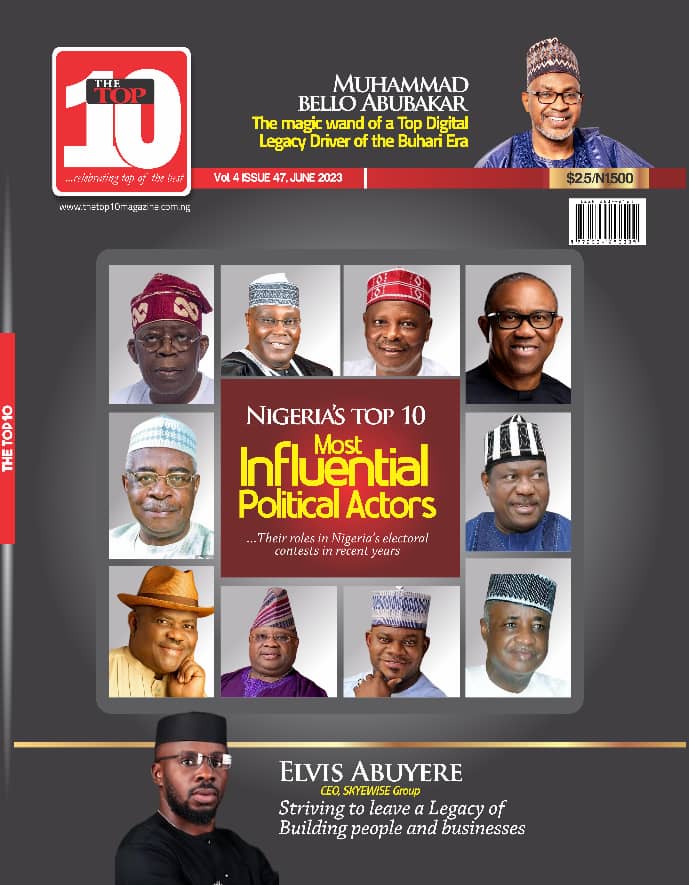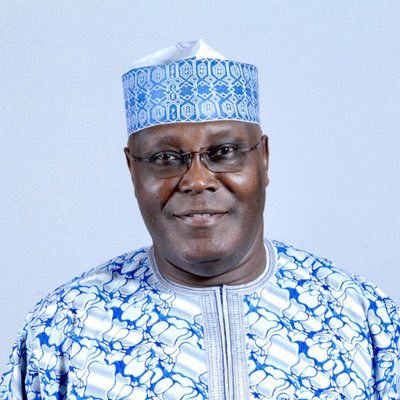Alhaji Atiku Abubakar, former Vice-President, was the first runner-up in the February 25 Nigerian Presidential election. He lost the election not for want of political influence. In fact, he is one of the most influential Nigerian politicians alive.
That influence has been clearly manifested in the results of the presidential primaries of his party, the Peoples Democratic Party (PDP) and the presidential election itself. In the primaries, Atiku, a northerner, emerged the presidential flagbearer against the popular expectation and push for the position to move to the South in 2023.

This was the second time he was picking the presidential ticket of the party, described by its members in its hey days as the biggest party in Africa, which ruled Nigeria for 16 years, between 1999 and 2015, largely on account of his political influence. He defeated 12 other contestants from both North and South. In a keenly contested presidential primary held at the Moshood Abiola Stadium in Abuja, the Adamawa state-born politician polled 371 votes, about half of the 764 accredited voters, to beat his closest challenger, Governor of Rivers State, Nyesom Wike, who came a distant second with 237 votes.
In the presidential election of February 25, Atiku confirmed his political influence by scoring 29 percent of the total votes cast, just eight percent behind the eventual winner, Asiwaju Bola Ahmed Tinubu, of the All Progressives Congress (APC), who garnered 37 percent. Atiku tied up with the President-elect and the second runner-up, Peter Obi of Labour Party, in winning in 12 states each, the latter having the advantage of also securing victory in the Federal Capital Territory (FCT).
Atiku’s nationwide influence also assisted many other Governorship, national and state legislative candidates of his party, PDP, to win their own elections. Thus, his influence has helped PDP retain its position as the leading opposition party in the forthcoming 10th National Assembly. In the senate, PDP won 36 seats to APC’s 59, while in the House of Representatives, PDP trailed APC with 102 to 162 seats.
Analysts general believe that Atiku’s performance in the 2023 presidential election was far below what his party, through his influence, was capable of delivering. They say he lost the election to internal wranglings in PDP. For instance, both Peter Obi and Rabiu Kwankwaso who started out as presidential aspirants of the party, seeing no prospect of securing the party’s ticket, left to pick those of Labour Party (LP) and New Nigeria People’s Party (NNPP), respectively.
Nyesom Wike, Governor of Rivers State, also followed the exit door after failing to win the primaries and snubbed in the choice of Atiku’s running mate. He took four other state Governors with him to fight against Atiku’s victory. As it turned out, the three runners up in the presidential election, namely, Atiku himself, Obi and Kwankwaso were all of the PDP family just before the election. Together, they polled about 60 percent of the vote. Analysts have been pondering what would have been had they stayed together in the party.
Professor Muhammed Jega, former Chairman of the Independent National Electoral Commission (INEC), for instance, put it this way: “The top three runners-up in this race got a combined 60% of the vote. That is impressive, but then, they only have themselves to blame that they did not present a united front before the election. They only tried to present a united front to contest the results.
“It is a case of locking the stables after the horses have bolted. Would they have made 60% of the vote if they had united behind a single candidate? Anybody’s guess.”
But Atiku is not guessing. He believes he actually won the election and has filed a petition before the Presidential Election Tribunal to prove his victory. If he succeeds, he will become president and Commander-in-chief of the Armed Forces of Nigeria, the office that would consolidate his position as the most influential politician in Nigeria.

The 2023 race makes the 6th time the former Vice-President would be contesting for the President of Nigeria. He had unsuccessfully contested five times for the office in 1993, 2007, 2011, 2015 and 2019. In 1993, he contested the Social Democratic Party presidential primaries, losing to Moshood Abiola and BabaGana Kingibe.
He was a presidential candidate of the Action Congress in the 2007 presidential election. He contested the presidential primaries of the PDP forthe 2011 presidential election losing to President GoodluckJonathan. He joined the APC ahead of the 2015 presidential election, contested and lost the presidential primaries to Muhammadu Buhari. He returned to PDP and was the party’s presidential candidate during the 2019 presidential election, again losing to the incumbent President.
When he declared for this year’s race, he said his enduring persistence “is borne outof my passion to rekindle the Nigerian dream that I was privileged to live. He said his return to the presidential race this time was in response to the yearnings of Nigerians.”
Born on November 25, 1946, in a small village, Jada, in Adamawa State, Atiku Abubakar is the only surviving child of his parents, Garba Abubakar, a Fulani trader, and Aisha Kande.
Atiku did not start his education until he was eight years old because his father strongly opposed western education. When the government discovered that he was not attending mandatory schooling, his father was jailed for a few days until his mother paid a fine. He was subsequently enrolled in Jada Primary School before proceeding to Adamawa Provincial Secondary School in Yola where he excelled in English Language and Literature.
Upon his graduation in 1965, he studied briefly at the Nigeria Police College in Kaduna but left when he was unable to produce an O-level Mathematics result. In 1966, he gained admission to the school of Hygiene in Kano after working as a Tax Officer in the regional Ministry of Finance. In his new school, he served as an Interim Student Union President and graduated with a diploma in 1967. With a regional scholarship, he enrolled for a Law Diploma at the Ahmadu Bello University in the same year and completed the programme in 1969. He went on to work for the Nigeria Customs Service during the Nigerian Civil War where he worked for 20 years. He rose to the position of Deputy Director, the second highest position in the Service before his retirement in April 1989. Upon retirement, he took up full time business and politics.
He ventured into business while serving as a Customs Officer. In 1974 he applied for andreceived a 31,000 Naira loan to build his first house in Yola, which he put up for rent.
From proceeds of the rent he purchased another plot, and built a second house. He continued this way, building a sizeable portfolio of property in Yola. He veered into agriculture in 1981 by acquiring 2,500 hectares of land near Yola to start a maize and cotton farm. The business eventually packed up in 1986.
Dogged in his ways, he ventured into trading, buying and selling truckloads of rice, flourand sugar but his most important business venture was when Gabrielle Volpi, an Italianbusinessman in Nigeria, invited him to set up Nigeria Container Services (NICOTES), alogistics company operating within the Ports. NICOTES would go on to provide immense wealth for Atiku. Conflict of interest accusations has since trailed him on account of his involvement in business while a civil servant, who exercised supervisory authority.
Atiku’s journey into the world of politics began in the early 1980s when he worked behind-the-scenes on the governorship campaign of Bamanga Tukur. Towards the end of his Customs career, he became acquainted with Shehu Musa Yar’Adua who had been second-in-command of the military government that ruled Nigeria between 1976 and 1979. In 1989, Atiku was elected a National Vice-Chairman of the Peoples Front of Nigeria, the political association led by Yar’Adua, to participate in the transition programme initiated by the military President, Ibrahim Babangida. Atiku won a seat to represent his constituency at the 1989 Constituent Assembly, set up to decide a new constitution for Nigeria. The People’s Front was eventually denied registration bythe government (none of the groups that applied was registered) and found a place within the Social Democratic Party, SDP, one of the two parties decreed into existence by the regime.
He ran for the office of Governor in Gongola State (now Adamawa and Taraba States) in 1991, and for the Presidency in 1993, placing third after MKO Abiola and Babagana Kingibe in the SDP primaries. In 1998, he was elected Governor of Adamawa State and it was while he was still Governor-Elect that the PDP presidential candidate, Olusegun Obasanjo, selected him as his running mate. The duo went on to winelections in February 1999, and Atiku was sworn in as Nigeria’s second democratically elected Vice-President on May 29, 1999.
In 2006, Atiku was involved in a bitter public battle with his boss, President Olusegun Obasanjo, ostensibly arising from the latter’s bid to amend certain provisions of the constitution to take another shot at the presidency (for the third consecutive time). Atiku’s stormy relationship with Obasanjo and his bid to succeed the latter met with stiff opposition. It took a judgment of the Supreme Court to allow Atiku contest after the Independent National Electoral Commission (INEC) initially disqualified him because he had been indicted for financial misconduct by an investigating panel set up at Obasanjo’s behest. The Supreme Court ordered theelectoral commission to restore Atiku’s name onto the presidential ballot.
Atiku left PDP and ran on the platform of the Action Congress because of his issues with Obasanjo. He lost, however, when he placed third after Umaru Yar’Adua and Muhammadu Buhari.
Not one to quit, he later returned to PDP where he contested for the presidential ticket in 2007 alongside former President Goodluck Ebele Jonathan (GEJ) and Sarah Jubrilbut lost to GEJ.
Atiku was PDP’s presidential candidate in the 2019 elections. He lost to the incumbent President.
A lot of allegations of corruption have been levelled against Abubakar. While most ofthem emanated from unproven media reports, most were believed to be orchestrated by his erstwhile boss, President Olusegun Obasanjo, with whom he engaged in political running battles during their time in office. But, to date, the former two-term Vice-President has never been convicted of corruption either in Nigeria or abroad. This has led to conclusions that the perception of corruption was foisted on him by suspicions of the source of his humongous wealth and political bad blood. In spite of his battered reputation, Atiku remains a critical fixture in Nigerian politics with millions of supporters all over the country.
Atiku’s claim to national reach began in early 1990s when he inherited the Gen. Shehu Yar’Adua’s political structures. Since then, he has been consolidating his national political network in every presidential election cycle as a contestant and as a two-term Vice-President. Today, his network of fanatical supporters run into millons, organized into numerous support groups.






